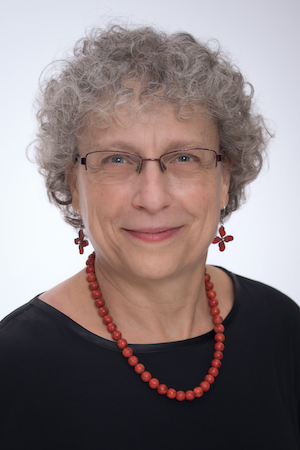
Julie Brill
Biography
Dr. Julie Brill is a Senior Scientist in the Cell & Systems Biology program at The Hospital for Sick Children Research Institute, a Professor of Molecular Genetics, and a Member of the Institute of Medical Science and the Collaborative Developmental Biology program at University of Toronto. She is internationally recognized for her discoveries related to cellular regulation and roles of phosphatidylinositol phosphates (PIPs) during animal development. Her lab has recently begun to elucidate mechanisms of post-transcriptional regulation during spermatogenesis.
Dr. Brill graduated with Distinction in Biology from Swarthmore College. She received her PhD in Biology from M.I.T. She did postdoctoral training at Stanford University School of Medicine and University of Washington. She is an Elected Fellow of the American Association for the Advancement of Science (AAAS).
Research
Phosphatidylinositol phosphates (PIPs) are membrane lipids with roles in cell growth, signaling and morphogenesis. Alterations in the levels of PIPs are associated with human developmental disorders and diseases such as cancers, yet little is known about the normal roles of PIPs during animal development.
The Brill lab investigates the roles of PIPs using powerful molecular genetic approaches available in the fruit fly Drosophila melanogaster. They have uncovered novel roles for PIPs and PIP pathway enzymes in sperm development, secretory granule maturation and tissue integrity. Brill's current research seeks to determine how PIPs and PIP pathway enzymes control these processes and to identify upstream regulators and downstream targets of PIP signaling.
In a second area of research, the Brill lab has recently begun to study mechanisms of post-transcriptional regulation and roles of long noncoding RNAs in sperm development. Because PIPs and RNA regulation play crucial roles in all eukaryotes, their results will reveal conserved cellular mechanisms that are fundamental to human development and disease.
Education
- 1997–2000: Visiting Postdoctoral Fellow, Zoology Department, University of Washington, Seattle, USA
- 1993–2000: Postdoctoral Fellow, Department of Developmental Biology, Stanford School of Medicine, Palo Alto, USA
- 1986–1993: PhD in Biology, Massachusetts Institute of Technology, Cambridge, USA
- 1981–1985: BA with Distinction in Biology, Swarthmore College, Swarthmore, USA
Experience
- 2013–Present: Full Professor, Department of Molecular Genetics, University of Toronto, Ontario
- 2011–Present: Senior Scientist, Cell & Systems Biology, The Hospital for Sick Children Research Institute, Toronto, Ontario
- 2003–Present: Member, Institute of Medical Science, University of Toronto, Ontario
- 2001–Present: Member, Collaborative Specialization in Developmental Biology, University of Toronto, Ontario
Awards
- 2017: Recipient, Excellence in Undergraduate Laboratory Teaching in Life Sciences Award, Faculty of Medicine, University of Toronto
- 2015: Elected Fellow, American Association for the Advancement of Science (AAAS)
Editorial Appointments
- 2010–Present: Editorial Board: Molecular Biology of the Cell
- 2019, 2020: Guest Editor, PLoS Genetics
- 2012–2014: Associate Editor, G3: Genes, Genomes, Genetics
- 2012–2014: Editorial Advisor, BMC Cell Biology
- 2011–2012: Co-editor, Spermatogenesis: Special issue devoted to Drosophila sperm development
- 2010–2017: Editorial Board, Spermatogenesis
Leadership Roles
- 2022–Present: Chair, Drosophila Image Awards Committee, Genetics Society of America
- 2020–2023: Co-organizer, Lipid Research Talks (virtual), American Society for Biochemistry and Molecular Biology
- 2019–2021: Canadian Representative, Fly Board, Genetics Society of America
- 2019: Co-organizer, Canadian Drosophila (CanFly) Research Conference
- 2018: Co-organizer, FASEB Scientific Research Conference on Phospholipid Signaling
- 2014: Organizer, Workshop on Drosophila male fertility as a cell biological model, Annual Drosophila Research Conference, Genetics Society of America
- 2013–2018: Director, Collaborative Specialization in Developmental Biology, University of Toronto
- 2011–2016: Member, Women in Cell Biology Committee, American Society for Cell Biology
Publications
- Ma, C. I. J., Yang, Y., Kim, T., Chen, C. H., Polevoy, G., Vissa, M., Burgess, J. and Brill, J. A. (2020) An early endosome-derived retrograde trafficking pathway promotes secretory granule maturation. J Cell Biol. Mar 2;219(3). pii: e201808017. PMID: 32045479
- Gupta, A. and Brill, J. A. (2018) Phosphatidylinositol 4,5-bisphosphate regulates cilium transition zone maturation in Drosophila melanogaster. J Cell Sci. Aug 17;131(16): pii: jcs218297. PMID: 30054387
- Del Bel, L., Griffiths, N., Ma, C. I. J., Blagoveshchenskaya, A., Wilk, R., Wei, H.-C., Burgess, J., M., Price, J. V., Mayinger, P. and Brill, J. A. (2018) The phosphoinositide phosphatase Sac1 regulates cell shape and microtubule stability in the developing Drosophila eye. Development. May 31;145(11). pii: dev15171. PMID: 29752385
- Fabian, L., Wei, H. C., Rollins, J., Noguchi, T., Polevoy, G., Blankenship, J. T., Bellamkonda, K., Gervais, L., Guichet, A., Fuller, M. T. and Brill, J. A. (2010) Phosphatidylinositol 4,5-bisphosphate directs spermatid cell polarity and exocyst localization in Drosophila. Mol Biol Cell. May 1;21(9):1546-1555. PMID: 20237161
- Polevoy, G., Wei, H. C., Wong, R., Szentpetery, Z., Kim, Y. J., Goldbach, P., Steinbach, S. K., Balla, T. and Brill, J. A. (2009) Dual roles for the Drosophila PI 4-kinase four wheel drive in localizing Rab11 during cytokinesis. J Cell Biol. Dec 14;187(6):847-858. PMID: 19995935
See all of Julie Brill's publications on PubMed.
Operating Grants
- CIHR Project Grant (Principal applicant): Uncovering mechanisms of PI4P-dependent transport during secretory granule biogenesis
- CIHR Project Grant (Co-applicant with Dr. H. Krause): Evolution and function of long noncoding RNAs in the male reproductive system
- CIHR Project Grant (Principal applicant): Deciphering the requirement for PIP5Ks in sperm head formation
- NSERC Discovery Grant (Principal applicant): Specialized translational machinery in the Drosophila male germline

